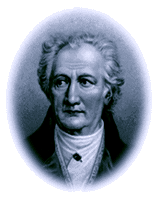

Investigating Goethe’s reason for leaving Weimar and his duties within the court provides an underlying foundation for reading “Italian Journey”. The person who we see Goethe to be during his travels, his way of thinking and doing things, is a result of his life in Weimar.
Goethe began as an author and by his early twenties became extremely popular. His two pieces, a play entitled “Gotz Von Berlichingen” and a novel entitled “The Sorrows of Young Werther” made him extremely well known throughout Europe. His popularity did not escape the attention of the Duke of Weimar, Carl August, who proceeded to invite Goethe into his residence in 1775 and then into office in 1776. Goethe took his political position seriously and, being in the favor of the Duke, moved to the position of a minister within office. Above all, Goethe valued the trust of the public and always maintained the need to keep in mind the well-being of the people. However, Goethe’s faith and trust in his government diminished with the Duke’s desire to unite the smaller German sates as a result of political tensions between Prussia and Austria. This was a move which, in Goethe’s mind, was foolish and unnecessary. Goethe’s faith in the government was further diminished following a scandal in the Parisian court. This scandal involved the Cardinal of France, who was arrested on account of a diamond necklace, worth twenty-million livres, that was taken apart, and the various pieces scattered throughout Holland and England (Haile, 8). This confirmed Goethe’s observations on the instances of corruption and deceit within the European ruling families. As a man whose principles involved personal morality, this was a disappointment.
Speculation on Goethe’s departure from Germany rests upon his dissatisfaction with the nobility and the feudal system. Other reasons include his life-long dream to see Italy and the slow accretion of frustrations in office.
Goethe’s dissatisfaction with his life in office becomes a valid reason as to why Goethe would choose to leave Weimar so suddenly, as seen in his urgent journal entry dated the 3rd of September 1786. Furthermore, this leads to Goethe’s constant desire to see things in a new way as mentioned in several of his journal entries. This is best shown in the following passage:
On December 2nd,
“Nothing, above all, is comparable to the new life that a reflective person experiences when he observes a new country. Though I am still always myself, I believe I have been changed to the very marrow of my bones” (Goethe, 147).
BACK || NEXT